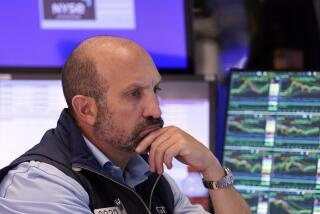Now It’s the Global Economy, Stupid
- Share via
It’s one thing when a U.S. president becomes a worldwide laughingstock; it’s another when the world starts to develop grave doubts about U.S. vitality and effectiveness. That’s no laughing matter. But that’s the risk America will run if Congress prolongs the current agony over America’s ethically challenged president. The very unfunny end result could be a collapse of U.S. global leadership.
The U.S. often lectures foreign elites, not only Asians, about the need for decisive leadership. Washington tells Tokyo to eschew petty parliamentary divisions and make timely decisions. It advises key ally South Korea, whose economic reform program is stuck in executive-legislative stalemate, to get its political house in order. It urges the Chinese not to devalue their currency, as that would undercut the region’s recovery efforts. Across the globe, from Moscow to Manila, Washington counsels others to get their own houses in order.
That’s also good advice for Washington. Even in normal times, U.S. leadership is essential to collective action; and these surely are not normal times. In Asia, the economic decay continues and is metastasizing to Latin America. The prospect of world recession will loom if Washington is not at the lead of corrective international action, as U.S. Treasury Secretary Robert Rubin has repeatedly said publicly--and privately, to the president.
This means steady U.S. support for the International Monetary Fund--virtually the sole, if admittedly flawed, international vehicle for an Asian bailout. But if the Republican-led Congress gets so bogged down in the debate over whether our Democratic president is impeachable, the IMF issue may get consigned to oblivion. That would doom vital matching contributions from other nations needed to increase available IMF funding and re-ignite failing economies.
The IMF controversy isn’t the only issue that cries out for steady attention. Two weeks ago North Korea lobbed what is now thought to be a satellite rocket in the direction of Japan, without observing the courtesy of prior warning to those in the projectile’s flight path. The instinctive reaction from Japan, as well as from the U.S. Congress, was to cut off all aid to North Korea. But how wise would this be? South Korea’s reform-minded President Kim Dae Jung is urging the West to stay the diplomatic course. Washington should listen. The South Korean government fears that tightening the noose on the North could wind up tightening the noose on the South. It could push the Stalinist Pyongyang regime in the direction of a desperate invasion option, or cause it to implode internally. And should North Korea come apart at the seams, spilling southward over the border, democratic South Korea could plunge into misery, darkness and poverty for years to come. “At a time when the world community is plagued by financial crisis,” complained an editorial in the Korea Times, “the lack of American leadership is a cause of concern.”
Steady U.S. leadership is also required to calm growing fears that world capitalism is pure evil. Much of America’s ideological achievement since the collapse of the Soviet Empire is under challenge. In Beijing, Taipei and Hong Kong, for instance, Western investor and speculator George Soros, accused by Malaysian Prime Minister Mahathir Mohamad of almost singlehandedly triggering the Asian currency crisis, is well on his way to becoming the Asian whipping boy for what is wrong with global markets.
This is why Congress, rather than stalling on IMF funding, ought to have under consideration a massive Marshall-type aid plan for Asia. Washington should also be working with its G-7 industrialized-nation allies to erect new firewalls against currency contagions. An authoritative new study of the Asian flu, “How Do Currency Crises Spread?”, published by the Federal Reserve Bank of San Francisco, proposes extensive regional monitoring of currency attacks and a lower threshold for intervention to forestall recurring currency trauma. Washington should be working on that.
Clinton’s speech Monday in New York on global economic problems re-endorsed IMF bailout efforts, urged others, especially Japan, to jump-start their economies without delay and called for new, high-level international cooperation to ward off world recession. The address, though completely welcome and necessary, could and should have been given months ago.
Problems of this magnitude will not put themselves on hold while America publicly sorts out its dirty laundry in a slow, self- indulgent ritual dance. Congress owes it to the world, not to mention America, to vote on the impeachment or censure questions, up or down, before the November elections, not after. The worst scenario would be for this sordid drama to drag on. If Clinton is not to be impeached (he almost certainly won’t resign), Congress should work with this morally flawed but policy-proficient chief executive in a manner more befitting a serious nation than some silly adolescent joke of a society. It may be impossible to stop the world from laughing. But there’s still time to keep the world economy from crashing.
More to Read
Sign up for Essential California
The most important California stories and recommendations in your inbox every morning.
You may occasionally receive promotional content from the Los Angeles Times.










